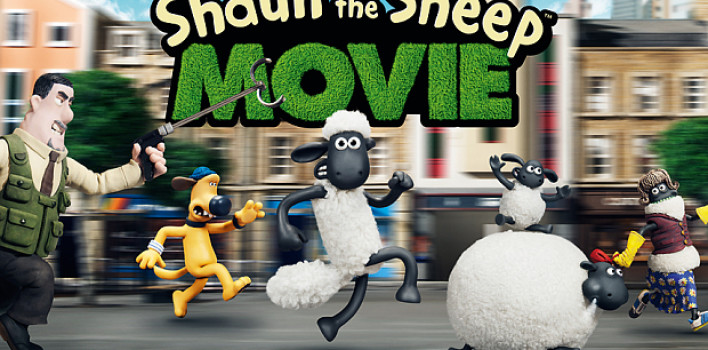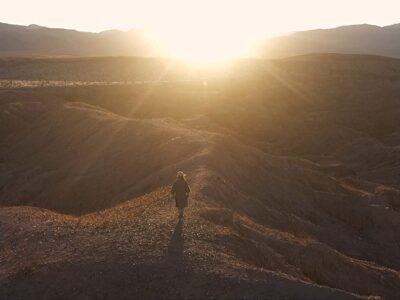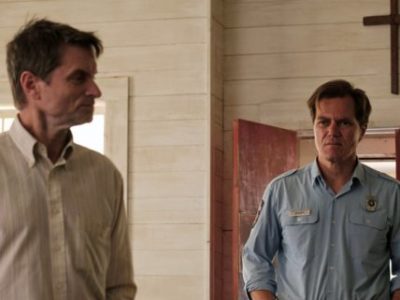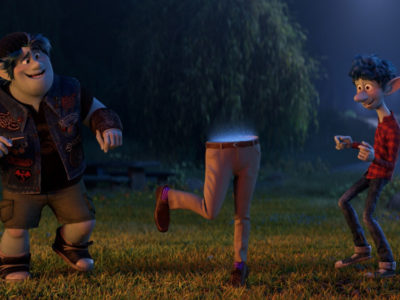Review| Shaun the Sheep Movie
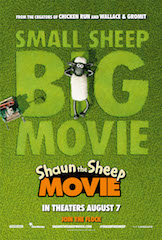 Only a month ago I lamented the sad, missed opportunity of the Minions movie to flesh out a premise of the main protagonists search for a master to serve. After an intriguing first five to ten minutes, the premise of finding a master—a calling card for the little yellow guys in the two Despicable Me movies—became opaque and eventually abandoned in favor of a generic plot line to get us to that fateful moment tying it back to the first two movies.
Only a month ago I lamented the sad, missed opportunity of the Minions movie to flesh out a premise of the main protagonists search for a master to serve. After an intriguing first five to ten minutes, the premise of finding a master—a calling card for the little yellow guys in the two Despicable Me movies—became opaque and eventually abandoned in favor of a generic plot line to get us to that fateful moment tying it back to the first two movies.
As a movie-going public, we did not have to wait long for a wide release to pick up the banner of that mishandled premise. And the answered call is the amiable bleats of England’s favorite stop-motion animated farm animal, Shaun the Sheep. His debut feature-length movie finds Shaun and his fellow flock wrestling with a stagnated sense of purpose and belonging.
Based on the very successful UK TV show, Shaun the Sheep—a spin-off of the well-known Wallace and Gromit franchise—the movie begins with a washed out Polaroid lens throwback montage to the origins of the farmstead setting of the show. Shaun and his fellow sheep, Bitzer, the loyal sheepdog, and the Farmer are a happy group full of youthful energy dancing to their favorite songs, enjoying a picnic, and each other’s company. However, as time has passed and the animals grew into their purpose as livestock, the community has deteriorated and their entire farm has settled into a sullen treadmill of duty and languid routine. A quick note that all of this is communicated through farm animal noises, grunts, gestures, and the scoring. There is not a word of actual dialogue in the movie, save the music, and it is incredibly wonderful!
Our protagonist, the titular Shaun, is unsettled by the drudgery of being herded form here to there and losing his super cool haircut to the farmer’s shears. He hatches a plan to give the sheep a day off from the daily grind of farm life. They party it up after tricking the Farmer into a snooze in a camper/trailer. One small hitch, however, leads to their poor farmer being carted away over rolling hills to the Big City. Initially leaving the pursuit of the Farmer to Bitzer, eventually Shaun decides to hop the bus to the Big City to find their lost leader. Not to be left to wait, the entire flock eventually finds its way to the big city and discovers their presence is not as welcome as it is in the country. The sinister and fanatical Animal Containment worker, A. Trumper, is out to capture our heroes and any other animal that stands in his way of ridding the city of strays.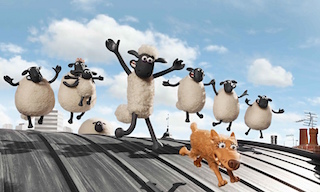
*slight spoilers from here on out*
When the flock of sheep expands include to another stray dog, Hazel, as well as Bitzer, they discover their Farmer has suffered from amnesia and made himself an overnight celebrity as the stylist of the stars, Mr. X. They hatch one final, grand heist to extricate their Farmer from the Big City, avoid the madcap Trumper, and return to their bucolic existence in the country.
The symbolic parallels to gospel and biblical literature, with its rural and sheep related imagery, is fairly obvious. Consequently, it behooves me to acknowledge I might be at risk of pulling some major Jesus Jukes in this review. I reserve the right to use up a large quotient of them due to ease of symbolism, but if any one’s eyes roll out of their head or cheese starts oozing out of your screen, please note you have been warned and I am also 10% sorry.
As a pastor and a church member—we must remember these are not mutually exclusive, pastors—the parallels to the Gospel accounts are poignant. When Shaun’s plan for a day off goes wrong, he and the sheep are literally and figuratively, sheep without a shepherd. They can’t feed themselves or do any of the things they normally look to the Farmer and the dependable Bitzer to take care of.
“When Jesus landed and saw a large crowd, he had compassion on them, because they were like sheep without a shepherd. So he began teaching them many things.” -Mark 6:34
Everyone one of us has a little bit of rebel in us, and it flares up all the more when we are threatened with the prospect of an unchanging, infinite loop of monotony. We’re wont to change jobs, hobbies, fashions, hairstyles, and routines to avoid the boredom that can inhabit schedules and consistent rhythms. Even more, within the American church we are prone to church shop, church hop, and flat out leave to break up the sameness of loving and living with a group of sinful, messed up, slightly boring group of people (but not MY church or me personally, of course).
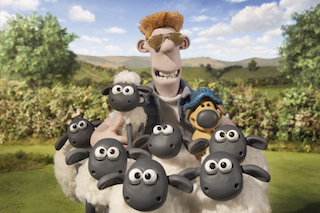 In a significantly delightful twist, however, it ultimately is not the lost sheep that need to be rescued, but the Farmer/Sheep Herder aka Shepherd. He has been stolen, due to his memory loss, by the glitz and glamor of the big city and his simple demeanor has been co-opted to brand him as the next big thing. They even photoshop his smile with a more austere, self-serious frown. It is not unlike the church’s attempts to dress up Jesus Christ and his message to fit the iconography and cultural trappings of modern society. Whether it is making Jesus white, a hipster, your smiling buddy, MMA Jesus, or whatever; there is the kernel of truth that God’s flock, the church, does need to continually rescue who Jesus is from the jaws of what culture wants him to be.
In a significantly delightful twist, however, it ultimately is not the lost sheep that need to be rescued, but the Farmer/Sheep Herder aka Shepherd. He has been stolen, due to his memory loss, by the glitz and glamor of the big city and his simple demeanor has been co-opted to brand him as the next big thing. They even photoshop his smile with a more austere, self-serious frown. It is not unlike the church’s attempts to dress up Jesus Christ and his message to fit the iconography and cultural trappings of modern society. Whether it is making Jesus white, a hipster, your smiling buddy, MMA Jesus, or whatever; there is the kernel of truth that God’s flock, the church, does need to continually rescue who Jesus is from the jaws of what culture wants him to be.
The narrative conclusion to Shaun the Sheep Movie does not end there. When the sheep find themselves in the threatening clutches of Trumper, now gone completely mad by this point, it is the Farmer’s awakened realization of his happy memories with his sheep and his faithful dog that spur him to protect his flock and expel the demonic animal containment worker from their midst. It is his joy and love that activate his duty to protect and the biblical comparisons are almost too ripe to bite into.
“I am the good shepherd; I know my sheep and my sheep know me—just as the Father knows me and I know the Father—and I lay down my life for the sheep.” -John 10:14-15
These symbols and allusions are far from perfect. The merits of rural life over city life could be inferred, but it makes no judgements to the merits of the pastoral beauty of the country or the hustle and bustle of a metropolis. Jesus does not need to be rescued by others, but he is the Rescuer. We are like sheep that have gone astray. At times, whether we mean to or not, have abandoned our master in favor of the promise of greener pastures. But our Good Shepherd laid down his life, as well as his very rights and privileges, to humbly serve us. We can learn from both the Shaun, the sheep, Bitzer, Hazel, and the Farmer that sacrificial service can reenergize and reactivate our love for one another. That is the Gospel according to Shaun the Sheep.


